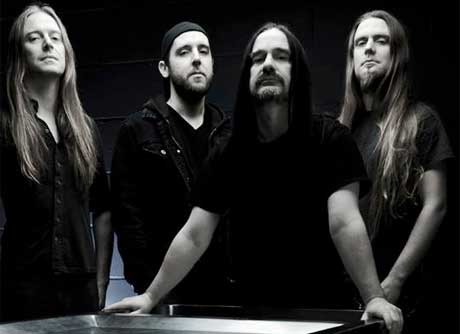When British death metal/grindcore granddaddies Carcass broke up in 1995, the album they left behind, Swansong, was far from what most fans wanted. Unlike their early output, which was gloriously low-fi gore-grind, or their melodic death metal (best exemplified on 1993 masterpiece Heartwork, the closest there's ever been to an arena-sized death metal album), Swansong was a bizarre mix of mainstream Southern rock and death metal lite — fun, but lacking the bite that the band was known for.
"Maybe we lost a bit of the fire," admits bassist/vocalist Jeff Walker, "in so much as [guitarist] Bill [Steer's] head was definitely going back to the kind of stuff he was into when he was younger. But I was totally on board with what he wanted to do and where he wanted to go. I stand by Swansong as much as I stand by [1988 debut] Reek of Putrefaction."
But they're back on the grind track: Surgical Steel, the band's first album since getting back together in 2007, occupies a middle ground between two of their classics: Heartwork and its predecessor, 1991's brilliant (and brilliantly titled) Necroticism - Descanting the Insalubrious. The new disc — which features old-school members Walker and Steer as well as new guys Ben Ash on guitar and Daniel Wilding behind the kit — combines the death metal intensity of Necroticism with the smart songwriting chops of Heartwork.
"Ultimately, we tried to make the best Carcass album ever; as to whether we achieved that, that's debatable, isn't it?" says Walker. "But yeah, the album is as strong as, or stronger than, some of our back catalogue. So what more can you do as a musician? If this was our worst album, that would be a failure, wouldn't it? But it's not."
Walker understands how long-time fans and journalists can be a bit nervous about the idea of Surgical Steel ("They approach the album like it's going to explode," he chuckles), given that Carcass is a band with a huge legacy in the extreme music scene.
"We're very conscious ourselves as music fans," he says. "We didn't want to disappoint anybody, and we didn't want to shit on our legacy. We wouldn't be releasing the album if it wasn't good enough."
He also understands the power of nostalgia and how hard it is to top classic albums that are so steeped in memories for older fans. "Those albums have a time and a place for people, and they really take people back and conjure up emotions that lay dormant. The other problem we've got, of course, is the past 17 years of aggressive music. I mean, do we look like a bunch of middle-aged men trying to keep up with the kids? That would be the danger."
With Surgical Steel, Carcass averted that awkward disaster by proving they can easily fit back in the extreme metal scene they left so long ago. And, good news: it sounds like the legacy the band has picked up and carried on with will go on for at least a while longer, even if the end is always in sight. "I can definitely see another album in us," says Walker, "before we call it a day."
"Maybe we lost a bit of the fire," admits bassist/vocalist Jeff Walker, "in so much as [guitarist] Bill [Steer's] head was definitely going back to the kind of stuff he was into when he was younger. But I was totally on board with what he wanted to do and where he wanted to go. I stand by Swansong as much as I stand by [1988 debut] Reek of Putrefaction."
But they're back on the grind track: Surgical Steel, the band's first album since getting back together in 2007, occupies a middle ground between two of their classics: Heartwork and its predecessor, 1991's brilliant (and brilliantly titled) Necroticism - Descanting the Insalubrious. The new disc — which features old-school members Walker and Steer as well as new guys Ben Ash on guitar and Daniel Wilding behind the kit — combines the death metal intensity of Necroticism with the smart songwriting chops of Heartwork.
"Ultimately, we tried to make the best Carcass album ever; as to whether we achieved that, that's debatable, isn't it?" says Walker. "But yeah, the album is as strong as, or stronger than, some of our back catalogue. So what more can you do as a musician? If this was our worst album, that would be a failure, wouldn't it? But it's not."
Walker understands how long-time fans and journalists can be a bit nervous about the idea of Surgical Steel ("They approach the album like it's going to explode," he chuckles), given that Carcass is a band with a huge legacy in the extreme music scene.
"We're very conscious ourselves as music fans," he says. "We didn't want to disappoint anybody, and we didn't want to shit on our legacy. We wouldn't be releasing the album if it wasn't good enough."
He also understands the power of nostalgia and how hard it is to top classic albums that are so steeped in memories for older fans. "Those albums have a time and a place for people, and they really take people back and conjure up emotions that lay dormant. The other problem we've got, of course, is the past 17 years of aggressive music. I mean, do we look like a bunch of middle-aged men trying to keep up with the kids? That would be the danger."
With Surgical Steel, Carcass averted that awkward disaster by proving they can easily fit back in the extreme metal scene they left so long ago. And, good news: it sounds like the legacy the band has picked up and carried on with will go on for at least a while longer, even if the end is always in sight. "I can definitely see another album in us," says Walker, "before we call it a day."
